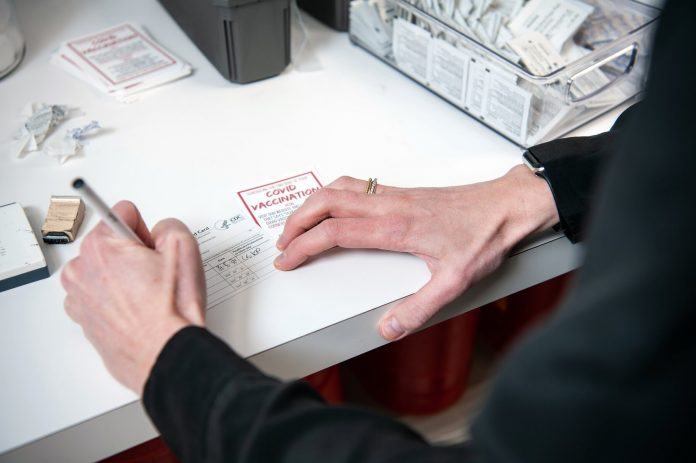Online stores offering counterfeit or stolen vaccine cards have mushroomed in recent weeks
Online scammers on Etsy, eBay, Facebook and Twitter started showing up little rectangular slips of paper for sale in late January. These slips were printed on a card stock and measured 3 by 4 inches and featured crisp black lettering. Sellers listed them for $20 to $60 each, with a discount on bundles of three or more and an extra cost for the laminated ones.
In the US, all these forgeries or falsified copies of the Centres for Disease Control and Prevention vaccination cards were given to people who have been inoculated against COVID-19.
Saoud Khalifah, the founder of Fakespot, which offers tools to detect fake listings and reviews of online scammers said, “We found hundreds of online stores selling the cards, potentially thousands were sold”.
The coronavirus has made opportunists out of many people, like those who hoarded bottles of hand sanitizer at the start of the pandemic or those who cheated recipients out of their stimulus checks. Now online scammers have latched on to the latest profit-making initiative: the little white cards that provide proof of shots.
Online stores offering counterfeit or stolen vaccine cards have mushroomed in recent weeks, said Khalifah. The efforts are far from hidden, with Facebook pages named “vax-cards” and eBay listings with “blank vaccine cards” openly hawking the items.
Federal laws that forbid copying the C.D.C. logo could be broken by selling fake vaccination cards, said legal experts. They could also violate identity theft laws if the cards were stolen by online scammers and filled out with false numbers and dates, they said.
As demand for the cards has grown from anti-vaccine activists and other groups, profiteers have pressed ahead. Airlines and other companies have recently said for people to safely travel or attend events, proof of COVID-19 immunization is required.
To offer digital proof of vaccinations, the cards may also become central to “vaccine passports”. People have been asked to upload copies of their C.D.C. cards by some tech companies developing vaccine passports. For its own digital proof of immunization, Los Angeles also recently began using the C.D.C. cards.
To call on Twitter, Shopify and eBay for stopping the online sale of false and stolen vaccine cards, 45 state attorneys general banded together last week. The officials said they were monitoring the activity and were concerned that unvaccinated people would misuse the cards to attend large events, potentially spreading the virus and prolonging the pandemic.
“We’re seeing a huge market for these false cards online,” said Josh Shapiro, attorney general of Pennsylvania, whose office has investigated fraud related to the virus. “This is a dangerous practice that undermines public health”.
The C.D.C. said it was “aware of cases of fraud regarding counterfeit Covid-19 vaccine cards.” It asked people not to share images of their personal information or vaccine cards online on social media.
Facebook, Twitter, eBay, Shopify and Etsy said that they were removing posts that advertised the items as the online sale of fake vaccine cards violated their rules.
Describing the vaccination cards as the “simplest” way to keep track of COVID-19 shots, the C.D.C. introduced them in December. By January, sales of false vaccine cards started picking up, said Khalifah. Many people found the cards were easy to forge from samples available online. Authentic cards were also stolen by pharmacists from their workplaces and put up for sale, he said.
Many people who bought the cards were opposed to the COVID-19 vaccines, he said. People have publicly boasted about getting the cards in some anti-vaccine groups on Facebook.
Other buyers want to use the cards to trick pharmacists into giving them a vaccine, said Khalifah. Because some of the vaccines are two-shot regimens, people can enter a false date for a first inoculation on the card, which makes it appear as if they need a second dose soon. Some pharmacies and state vaccination sites have given priority to people due for their second shots.
Mr. Shapiro, the Pennsylvania attorney general, said that in addition to violating federal copyright laws, the sale of counterfeit and stolen cards most likely broke civil and consumer protection laws that mandate that an item can be used as advertised. The cards could also violate state laws regarding impersonation, he said.
“We want to see them stop immediately,” Mr. Shapiro said of the fraudsters. “And we want to see the companies take serious and immediate action”.
Also read:Digital transformation: A required change and a new operating model in the BFSI industry
Do Follow: CIO News LinkedIn Account | CIO News Facebook | CIO News Youtube | CIO News Twitter






